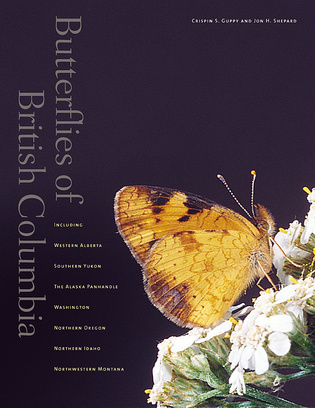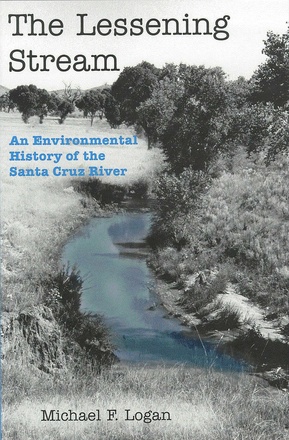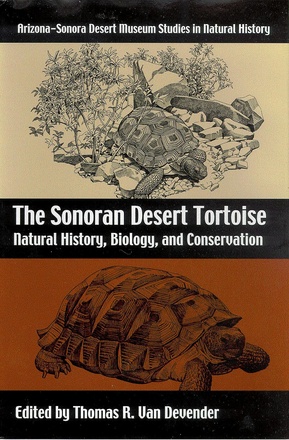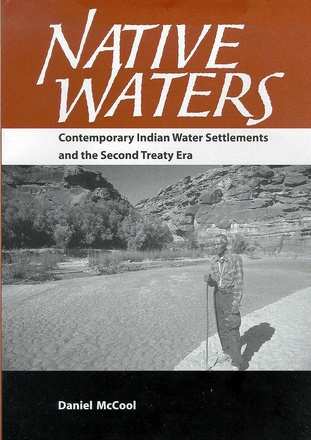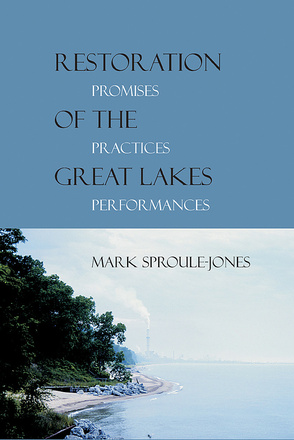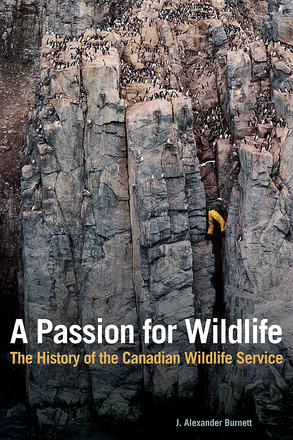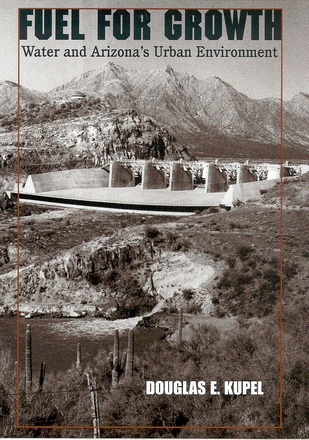Butterflies of British Columbia
Including Western Alberta, Southern Yukon, the Alaska Panhandle, Washington, Northern Oregon, Northern Idaho, and Northwestern Montana
The butterfly fauna of British Columbia is by far the largest and most diverse in Canada. With the publication of this volume, there is finally a comprehensive, single source that summarizes all available information on butterflies in the British Columbia and adjacent areas.
The Lessening Stream
Newcomers to Tucson know the Santa Cruz River as a dry bed that can become a rampaging flood after heavy rains. Yet until the late nineteenth century, the Santa Cruz was an active watercourse that served the region's agricultural needsuntil a burgeoning industrial society began to tap the river's underground flow.
The Lessening Stream reviews the changing human use of the Santa Cruz River and its aquifer from the earliest human presence in the valley to today. Michael Logan examines the social, cultural, and political history of the Santa Cruz Valley while interpreting the implications of various cultures' impacts on the river and speculating about the future of water in the region.
Logan traces river history through three erasarchaic, modern, and postmodernto capture the human history of the river from early Native American farmers through Spanish missionaries to Anglo settlers. He shows how humans first diverted its surface flow, then learned to pump its aquifer, and today fail to fully understand the river's place in the urban environment.
By telling the story of the meandering riverfrom its origin in southern Arizona through Mexico and the Tucson Basin to its terminus in farmland near PhoenixLogan links developments throughout the river valley so that a more complete picture of the river's history emerges. He also contemplates the future of the Santa Cruz by confronting the serious problems posed by groundwater pumping in Tucson and addressing the effects of the Central Arizona Project on the river valley.
Skillfully interweaving history with hydrology, geology, archaeology, and anthropology, The Lessening Stream makes an important contribution to the environmental history of southern Arizona. It reminds us that, because water will always be the focus for human activity in the desert, we desperately need a more complete understanding of its place in our lives.
The Sonoran Desert Tortoise
One of the most recognizable animals of the Southwest, the desert tortoise (Gopherus agassizii) makes its home in both the Sonoran and Mohave Deserts, as well as in tropical areas to the south in Mexico. Called by Tohono O'odham people "komik'c-ed," or "shell with living thing inside," it is one of the few desert creatures kept as a domestic petas well as one of the most studied reptiles in the world.
Most of our knowledge of desert tortoises comes from studies of Mohave Desert populations in California and Nevada. However, the ecology, physiology, and behavior of these northern populations are quite different from those of their southern, Sonoran Desert, and tropical cousins, which have been studied much less. Differences in climate and habitat have shaped the evolution of three races of desert tortoises as they have adapted to changes in heat, rainfall, and sources of food and shelter as the deserts developed in the last ten million years.
This book presents the first comprehensive summary of the natural history, biology, and conservation of the Sonoran and Sinaloan desert tortoises, reviewing the current state of knowledge of these creatures with appropriate comparisons to Mohave tortoises. It condenses a vast amount of information on population ecology, activity, and behavior based on decades of studying tortoise populations in Arizona and Sonora, Mexico, and also includes important material on the care and protection of tortoises.
Thirty-two contributors address such topics as tortoise fossil records, DNA analysis, and the mystery of secretive hatchlings and juveniles. Tortoise health is discussed in chapters on the care of captives, and original data are presented on the diets of wild and captive tortoises, the nutrient content of plant foods, and blood parameters of healthy tortoises. Coverage of conservation issues includes husbandry methods for captive tortoises, an overview of protective measures, and an evaluation of threats to tortoises from introduced grass and wildfires. A final chapter on cultural knowledge presents stories and songs from indigenous peoples and explores their understanding of tortoises.
As the only comprehensive book on the desert tortoise, this volume gathers a vast amount of information for scientists, veterinarians, and resource managers while also remaining useful to general readers who keep desert tortoises as backyard pets. It will stand as an enduring reference on this endearing creature for years to come.
Awe for the Tiger, Love for the Lamb
A Chronicle of Sensibility to Animals
This impressive compedium of writings, speaches, and other expression shows that respect for animals has always been part of human thought.
Native Waters
Since the beginning of the reservation era, the bitter conflict between Indians and non-Indians over water rights was largely confined to the courtroom. But in the 1980s the federal government began to emphasize negotiated settlements over lawsuits, and the settlements are changing water rights in fundamental waysnot only for tribes but also for non-Indian communities that share scarce water resources with Indians.
In Native Waters, Daniel McCool describes the dramatic impact these settlements are having both on Indian country and on the American West as a whole. Viewing the settlements as a second treaty era, he considers whether they will guarantee the water future of reservationsor, like treaties of old, will require tribes to surrender vast resources in order to retain a small part of their traditional homelands. As one tribal official observed, "It's like your neighbors have been stealing your horses for many years, and now we have to sit down and decide how many of those horses they get to keep." Unlike technical studies of water policy, McCool's book is a readable account that shows us real people attempting to end real disputes that have been going on for decades. He discusses specific water settlements using a combination of approachesfrom personal testimony to traditional social science methodologyto capture the richness, complexity, and human texture of the water rights conflict. By explaining the processes and outcomes in plain language and grounding his presentation in relevant explanations of Indian culture, he conveys the complexity of the settlements for readers from a wide range of disciplines.
Native Waters illustrates how America is coming to grips with an issue that has long been characterized by injustice and conflict, seeking to enhance our understanding of the settlements in the hope that this understanding will lead to better settlements for all parties. As one of the first assessments of a policy that will have a pervasive impact for centuries to come, it shows that how we resolve Indian water claims tells us a great deal about who we are as a nation and how we confront difficult issues involving race, culture, and the environment.
Restoration of the Great Lakes
Promises, Practices, and Performances
Using original findings from surveys, interviews, and other documents, this volume looks at how various levels of government are attempting to restore the environment in the Great Lakes.
A Passion for Wildlife
The History of the Canadian Wildlife Service
A chronicle of the Canadian Wildlife Service and the evolution of wildlife policy over the first 50 years of this venerable Canadian institution's history.
Fuel for Growth
Cities in the arid West would not be what they are today without water and the technology needed to deliver it to users. The history of water development in Arizona goes hand in hand with the state's economic growth, and Arizona's future is inextricably tied to this scarce resource. Fuel for Growth describes and interprets the history of water resource development and its relationship to urban development in Arizona's three signature cities: Phoenix, Tucson, and Flagstaff. These three urban areas could hardly be more different: a growth-oriented metropolis, an environmentally conscious city with deep cultural roots, and an outdoor-friendly mountain town. Despite these differences, their community leaders and public officials have taken similar approaches to developing water resources with varying degrees of success and acceptance. Douglas Kupel has created a new vision of water history based on the Arizona experience. He challenges many of the traditional assumptions of environmental history by revealing that the West's aridity has had relatively little impact on the development of municipal water infrastructure in these cities. While urban growth in the West is often characterized as the product of an elite group of water leaders, the development of Arizona's cities is shown to reflect the broad aspirations of all their citizens. The book traces water development from the era of private water service to municipal ownership of water utilities and examines the impact of the post-World War II boom and subsequent expansion. Taking in the Salt River Project, the Central Arizona Project, and the Groundwater Management Act of 1980, Kupel explores the ongoing struggle between growth and environmentalism. He advocates public policy measures that can sustain a water future for the state. As the urban West enters a new century of water management, Arizona's progress will increasingly be tied to that of its ever-expanding cities. Fuel for Growth documents an earlier era of urban water use and provides important recommendations for the future path of water development in the West's key population centers.

